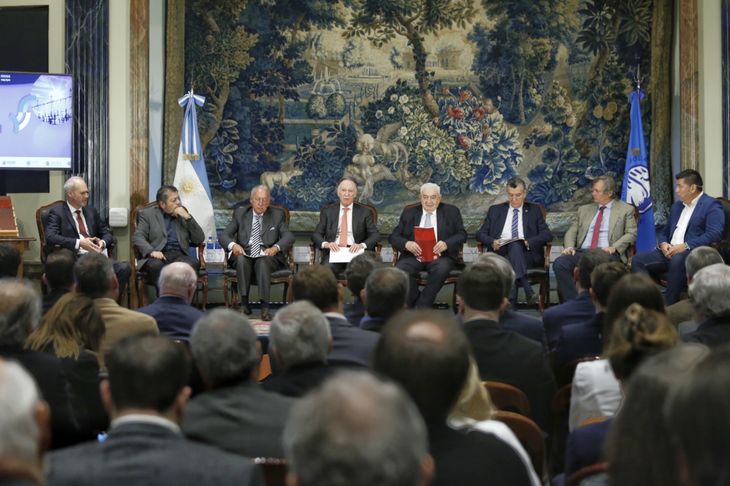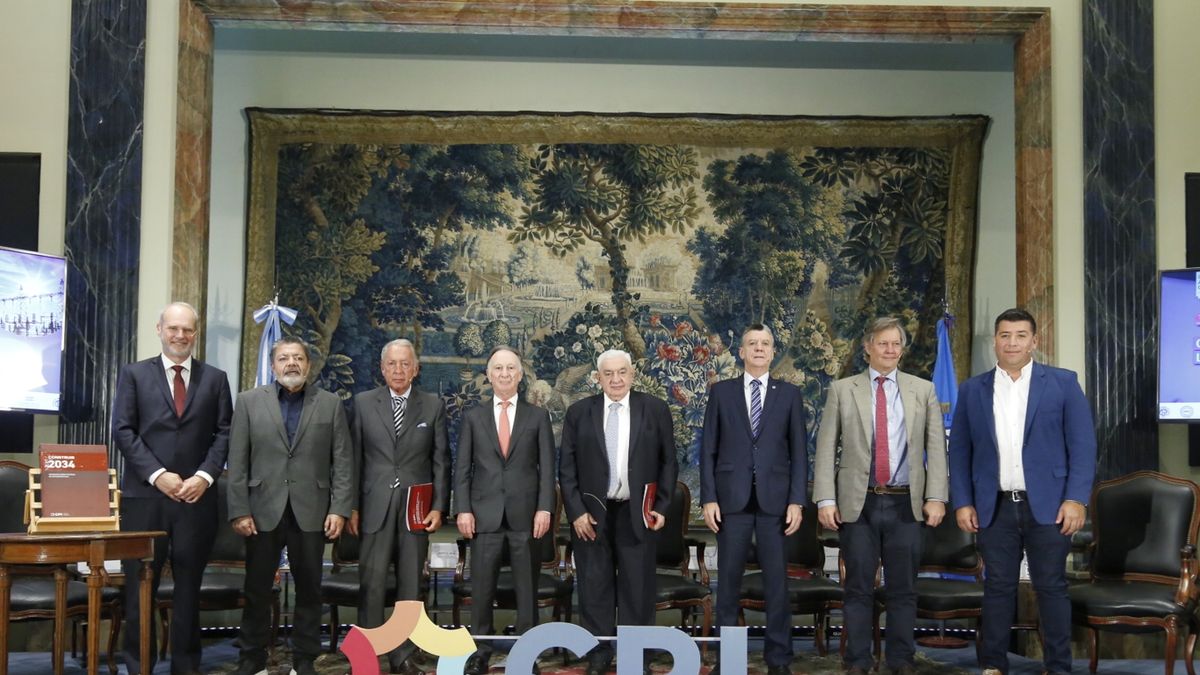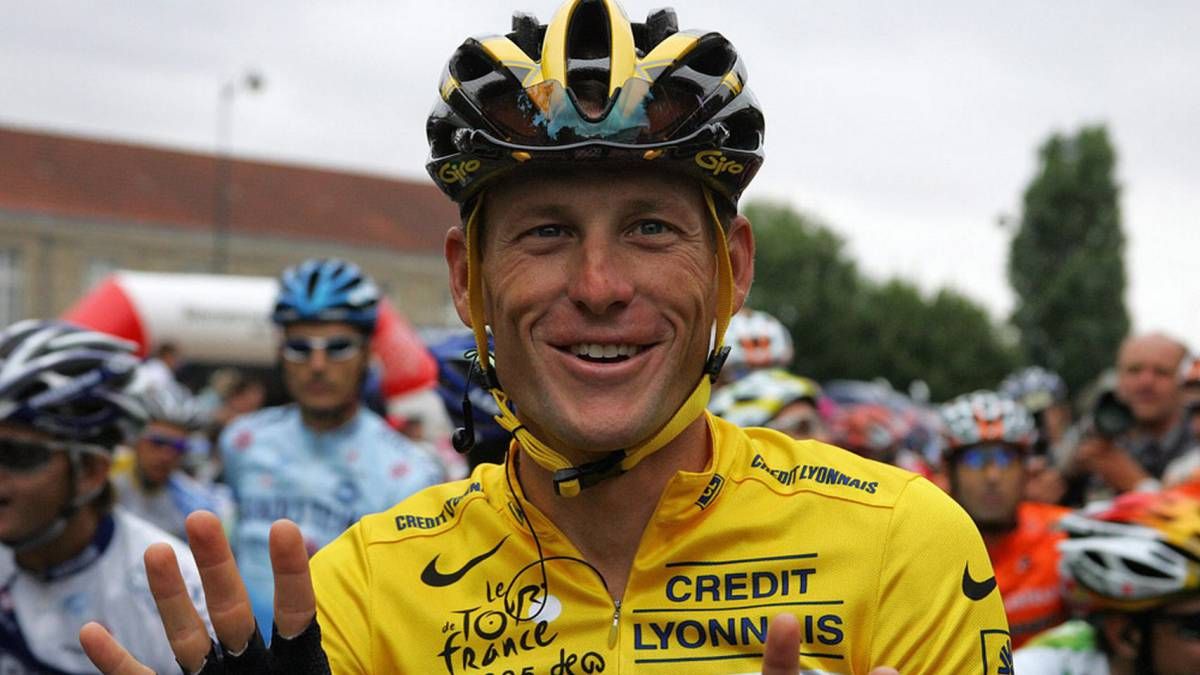Concern for the present and for the immediate futureso it can be summarized the spirit of the main business leaders of the country. In the immediate future, due to the fragile economic situation, the lack of foreign currency and inflation, in a context in which the result of the PASO added more uncertainty.
The concerns of businessmen could be perceived this Thursday in the framework of a meeting that brought together representatives of the group of 6 – Argentine Chamber of Construction (CAMARCO), Argentine Industrial Union (UIA), Argentine Banks Association (ADEBA), Buenos Aires Stock Exchange (BCBA), Argentine Chamber of Commerce and Services (CAC) and Argentine Rural Society (SRA) )- with the General Confederation of Labor (CGT) and the Construction Workers’ Union (UOCRA).
The meeting was held to present the book “Build 2034 “Consensus on Planning”a compilation about the infrastructure policies necessary for the development of Argentinaa document that will be delivered to all presidential candidates.
The event was held in the halls of the Stock Exchange and to get there the participants had to go through a heavy rain. “Consequence of climate change”, commented one of the businessmen present upon entering drenched, while recalling that javier mileithe winner of the primary elections, denies environmental issues.
At a time when the libertarian candidate asserts that the State will not allocate funds for public worksGustavo Weiss, president of the Chamber of Construction, reminded him that, in central countries, infrastructure works in private hands “They are not more than 10 percent of the total.”
The intention of the work, as Weiss explained, is “to serve as a reference guide for future public policies and for the respective infrastructure projects.”
PHOTO 6 CPI.jpeg
Surprise for the result of the PASO
This act was the first that brought together the main business leaders after the “amazing” result of the elections, in reference to the triumph of Milei. Not a few businessmen expressed their concern about the economist’s proposals -Several people know him from the days when he worked for Eduardo Eurnekian-.
His extreme proposals such as, for example, dissolve the Central Bank, dollarization, eliminate Mercosur and not make pacts with China -the main trading partners of the country-, generated uncertainty in many businessmen.
To this is added that the technical teams are not known, except for a few referents such as economists Carlos Rodríguez, Roque Fernández, Diana Mondino and Darío Epstein.
They admit that they have had almost no contact with Milei except at the lunch organized by the Inter-American Council of Commerce and Production, at the end of last June when he was the only speaker.
On that occasion, it should be noted, he was listened to carefully, but with a certain distance since, deep down, they saw him as a candidate with the possibility of finishing in third place, well behind Juntos por el Cambio and the ruling party.
“He can be president” commented some in the coffee break not without certain anxiety. Others expressed their conviction that the ballotage will be with Milei.
There was no consensus on who will be the other candidate to challenge him for the presidency in the runoff. Some thought it could be Patricia Bullrich and others bet on Sergio Massa. But, what became clear is the general confusion that is summarized in this sentence from one of the managers: “I no longer dare to make any forecasts regarding the elections.”
In the opinion of the businessmen, the triumph of La Libertad Avanza at the polls has several explanations. They view the “fierce campaign” of the Together for Change candidates as responsible: “they kept fighting among themselves and forgot to speak to the electorate”, commented one of them.
Others, meanwhile, argued that “Milei’s proposals, in particular, dollarization and caste removal, responded to a demand from a large part of society”.
PHOTO 5 CPI.jpeg

Defense of the State (with criticism)
Milei’s disruptive proposals were questioned during the event. There was a defense of the Statebut his role was not without criticism.
Javier Bolzico, ADEBA president admitted that: “faced with unlimited needs with limited resources, we have the challenge of how to allocate them efficiently… Have transparency and competence in all processes and efficiency in execution”.
While, Adelmo Gabbi, The head of the BCBA remarked: “Businessmen have to be there to support everything that means working together. We don’t have to push our elbows forward, We have to go hand in hand.”
Natalio Mario Grinmanpresident of the CAC expressed: “Argentina is an extremely rich country. Therefore, what is happening is unacceptable. We must reconsider all sectors, economic, social and political. So this country at some point will return to normality”.
For the union sector, Christian Jerome, Secretary of Health and Safety of the Board of Directors of the CGT and Secretary General of SEIVARA pointed out: “We have to return to the culture of the meeting to be able to carry out strategic planning on the infrastructure and on our country” and, calling for dialogue, he stated “from the CGT we are convinced that this is the path, generating the necessary agreements”.
For his part, Daniel Funes de Riojapresident of the UIA affirmed that “State policies are part of our commitment”.
Gerardo MartinezSecretary General of the UOCRA closed the event and anticipated that they are working to achieve “the consensus on energy policy” and made a call to “consolidate cohesion and achieve dialogue to move Argentina forward”.
Source: Ambito




